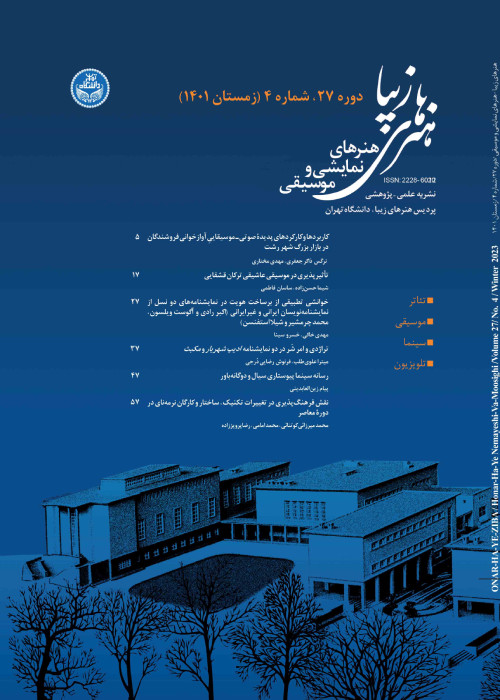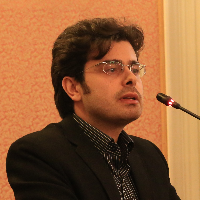Classification of Iranian Classical Music Repertoire Based on Discourses of Identity
Author(s):
Article Type:
Research/Original Article (دارای رتبه معتبر)
Abstract:
The question of “identity” has been a critical problem in the context of Iranian musical tradition. A three step approach is used in this article in order to best address this important and pending issue. First, the authors identify how this problem is built in a society focusing on a musical culture. Secondly, the number and more specifically which discourses are formed around this issue are introduced and discussed. Lastly, the authors propose how to classify Iranian classical repertoire using these data.Initially it is important to explain the conditions of recognizing “identity” as a problem. It seems that reference identity, other’s identity, communication and information development are three critical components in forming the issue. The first refers to a society which has some specific characteristics. The second, “other’s identity” is a reference to a comparison of other cultures with different identity characteristics. In the 20th century, the most significant comparison of other’s identity is with the western culture. The third component has become effective since information technology is influencing cultures specifically in the second part of the 20th century. The second step is analysis of discourses about identity, is discussed through a genealogy of several expressions that are used for naming and explaining Iranian tradition, by different classes of opinions in the culture. The first expression is Melli (national) music. This thought of musical identity comes from an idea that tradition is closely related to national identity which is the conclusion of Alinaghi Vaziri’s school of thought. One of the most prominent characteristics of the discourse, is that it accepts some western musical values as a means to modernizing music. The second expression is Sonnati (Traditional) music which is focusing on a historical heritage as the main identical idea. Reference and the main source of authentication in this thought, is the Radif as classified repertoire of the Qajar era which is the central repertoire of the discourse. The third expression is Dastagahi music which is the name of traditional Iranian musical language. The importance of this expression is due to the specific musicological approach rather than nonmusical nomenclature from the previous categories mentioned. Its approach to the internal content of music is unique and significant in the tradition as a whole. The content of the music in these two last discourses are intergrade able. The last cornerstone expression is ‘Iranian classical music’. This is a music-based terminology and has been used frequently in the last 30 years. This expression tries to overcome the identity challenge by collecting various aspects of words that represent a comprehensive musical perspective. This expression has a wide and unified view about the identity of tradition; while representing its own ideal repertoire that is a continuation from the historical tradition of Iranian music. With reference from another research by the same authors: Recognition of Central Features as Characteristic Elements in Iranian Classical Music (2020), the classification of terminology and repertoire representation brings together the categories of Sonnati and Dastgahi whilst separating Melli repertoire as another genre and using ‘Iranian classical repertoire’ as a general term that represents all of these aforementioned categories. On the other hand, there is a repertoire that could not be classified as part of the Iranian classical context but it’s a part of western classical repertoire which apply some characteristic elements of Iranian music. They are referred to as Iranian-based (western) classical repertoire.
Keywords:
Language:
Persian
Published:
Honar-Ha-Ye-Ziba: Honar-Ha-Ye Mosighi Va Namayeshi, Volume:26 Issue: 72, 2022
Pages:
41 to 51
magiran.com/p2407949
دانلود و مطالعه متن این مقاله با یکی از روشهای زیر امکان پذیر است:
اشتراک شخصی
با عضویت و پرداخت آنلاین حق اشتراک یکساله به مبلغ 1,390,000ريال میتوانید 70 عنوان مطلب دانلود کنید!
اشتراک سازمانی
به کتابخانه دانشگاه یا محل کار خود پیشنهاد کنید تا اشتراک سازمانی این پایگاه را برای دسترسی نامحدود همه کاربران به متن مطالب تهیه نمایند!
توجه!
- حق عضویت دریافتی صرف حمایت از نشریات عضو و نگهداری، تکمیل و توسعه مگیران میشود.
- پرداخت حق اشتراک و دانلود مقالات اجازه بازنشر آن در سایر رسانههای چاپی و دیجیتال را به کاربر نمیدهد.
In order to view content subscription is required
Personal subscription
Subscribe magiran.com for 70 € euros via PayPal and download 70 articles during a year.
Organization subscription
Please contact us to subscribe your university or library for unlimited access!



